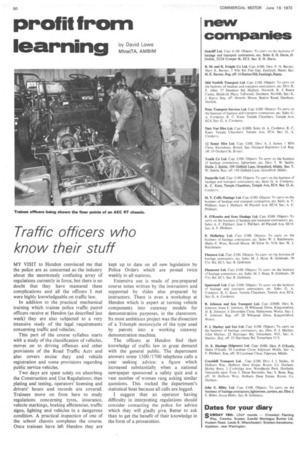Traffic officers who know their stuff
Page 52

If you've noticed an error in this article please click here to report it so we can fix it.
MY VISIT to Hendon convinced me that the police are as concerned as the industry about the enormously confusing array of regulations currently in force, but there is no doubt that they have mastered these complications and all the officers I met were highly knowledgeable on traffic law.
In addition to the practical mechanical training which trainee police traffic patrol officers receive at Hendon (as described last week) they are also subjected to a very intensive study of the legal requirements concerning traffic and vehicles.
This part of the course syllabus starts with a study of the classification of vehicles, moves on to driving offences and other provisions of the Road Traffic Acts and also covers excise duty and vehicle registration and some provisions regarding public service vehicles.
Two days are spent solely on absorbing the Construction and Use Regulations; then plating and testing, operators' licensing and drivers' hours and records are covered. Trainees move on from here to study regulations concerning tyres, insurance,
vehicle markings, braking efficiencies, traffic
signs, lighting and vehicles in a dangerous condition. A practical inspection of one of the school chassis completes the course. Once trainees have left Hendon they are kept up to date on all new legislation by Police Orders which are posted twice weekly in all stations.
Extensive use is made of pre-prepared course notes written by the instructors and supported by slides also prepared by instructors. There is even a workshop at Hendon which is expert at turning vehicle components into cutaway models for demonstration purposes, in the classroom. Its most ambitious project was the dissection of a Triumph motorcycle of the type used by patrols into a working cutaway demonstration machine.
The officers at Hendon find their knowledge of traffic law in great demand with the general public. The department answers some 1500/1700 telephone calls a year seeking advice; a figure which increased substantially when a national newspaper sponsored a safety quiz and a vast number of women rang asking similar questions. This rocked the department's statistical boat because all calls are logged.
I suggest that an operator having difficulty in interpreting regulations should consider contacting the police for advice which they will gladly give. Better to ask than to get the benefit of their knowledge in the form of a prosecution.




























































































